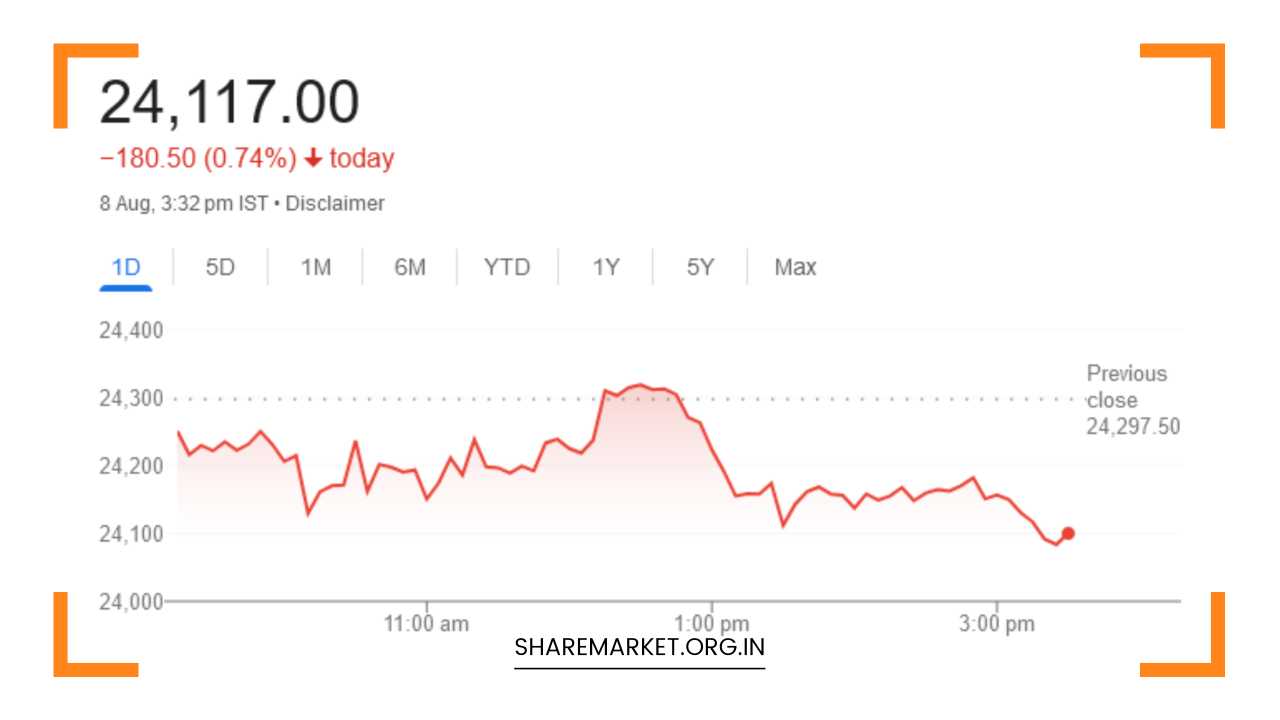Sensex Down 581 Points. Nifty at 24,117; Nifty Prediction for Tomorrow

Nifty Prediction for Tomorrow
Market Tanks on RBI Policy Day; Volatility Expected to Persist
Mumbai, August 8: The Indian stock market experienced a turbulent day of trading on the Reserve Bank of India’s (RBI) monetary policy announcement, with the benchmark indices,
Nifty 50 and Sensex, closing sharply lower. The market’s decline underscores growing investor apprehension amid a confluence of global and domestic uncertainties.
The Nifty 50 fell 180.50 points, ending the day at 24,117, while the Sensex dropped by 581.79 points to close at 78,886.22.
The broader market also reflected the negative sentiment, with the midcap index declining by 0.4% and the smallcap index remaining largely unchanged.
Sectoral Performance
Sectoral performance presented a mixed picture. The pharmaceutical sector stood out as a rare bright spot, with its stocks managing to outperform other indices amid the overall market decline.
This sector’s relative strength can be attributed to its defensive nature and consistent demand, which tend to insulate it from broader market fluctuations.
In contrast, the Information Technology (IT) and metal sectors were hit hard by the sell-off. IT stocks, which have been grappling with concerns over global economic slowdowns and reduced tech spending, saw significant declines.
Similarly, metal stocks faced pressure from falling commodity prices and weakening demand, exacerbating the overall market downturn.
Factors Driving Market Downfall
The market’s downturn can be attributed to a variety of factors, both global and domestic. On the international front, global uncertainties have been weighing heavily on investor sentiment.
The approaching US elections have introduced a layer of political risk, while speculation about potential interest rate cuts by the Federal Reserve has led to concerns about global economic stability.
Additionally, the ongoing geopolitical tensions between Israel and Iran have contributed to a heightened sense of instability in the international arena.
Domestically, while the monsoon season has been favorable, boosting hopes for improved agricultural output and better inflation control, the Indian market remains sensitive to the impact of high interest rates.
The RBI’s monetary policy stance, which includes maintaining elevated interest rates to combat inflation, has continued to create a challenging environment for both businesses and consumers.
High borrowing costs and a tight liquidity situation have been limiting economic activity and impacting corporate earnings.
Analyst Outlook
Aditya Gaggar, director of Progressive Shares, provided an analysis of the current market conditions, noting that the Nifty 50 has been oscillating within a broad range.
According to Gaggar, the index is currently facing support at 23,965 and resistance at 24,330. A decisive breakout beyond these levels will be crucial in determining the market’s future direction.
A sustained move above resistance could signal a potential rally, while a fall below support might indicate further declines.
Ajit Mishra of Religare Broking echoed a cautious sentiment, highlighting the resistance level at 24,350 for the Nifty.
Mishra warned that if the index breaches the 23,900 support level, it could lead to a more pronounced decline. His outlook reflects the prevailing uncertainty and the need for investors to remain vigilant and adaptable to changing market conditions.
Way Forward
Looking ahead, market experts agree that volatility is likely to be a persistent feature in the coming months. Investors are advised to adopt a hedged strategy to navigate the current turbulent environment effectively.
This could involve diversifying portfolios, using financial instruments to hedge against potential losses, and staying informed about market trends and economic indicators.
Despite the short-term volatility, the long-term prospects for the Indian economy remain positive. The favorable monsoon conditions and the potential for interest rate cuts in the future could support economic growth and enhance corporate earnings.
As the global and domestic economic landscapes evolve, these factors could create opportunities for investors.
For those with a long-term investment horizon, the current market correction presents an opportunity to acquire fundamentally strong companies at attractive valuations.
Investors are encouraged to focus on high-quality stocks with robust fundamentals and growth potential. Such an approach can be beneficial in building wealth over time, despite short-term market fluctuations.
Final Remarks
The sharp decline in the Indian stock market on RBI policy day highlights the prevailing uncertainties in both global and domestic economies.
While the immediate outlook is marked by volatility, the long-term prospects for the Indian economy are more encouraging.
Investors should maintain a disciplined approach, focusing on quality stocks and adopting strategies that align with their risk tolerance and investment goals.
By doing so, they can navigate the current market challenges and position themselves for future growth and wealth creation.

















